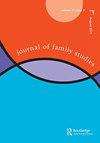Similarities and differences between coparenting and parental gatekeeping: implications for father involvement research
IF 1.4
4区 社会学
Q3 FAMILY STUDIES
引用次数: 0
Abstract
ABSTRACT A family systems perspective highlights the multiple interdependent relationships that may influence fathers’ parenting and, in turn, child outcomes. Notably, coparenting, or how parents collaborate in raising the child, has been linked to father involvement. More recently, parental gatekeeping, or one parent’s efforts to manage the other parent’s interactions with the child, has been introduced as part of the coparenting relationship. Researchers have reported associations between maternal gatekeeping, including mothers’ encouragement (i.e. gate opening) and discouragement (i.e. gate closing), and fathers’ parenting. However, multidimensional models of coparenting do not explicitly identify a parental gatekeeping component. Additionally, parental gatekeeping and coparenting lines of research have been pursued relatively independently. This raises questions about how parental gatekeeping and other dimensions of the coparenting relationship may be similarly and differentially linked to fathers’ parenting. To clarify the nature of coparenting and parental gatekeeping, this article provides an overview of foundational research. Similarities and differences in the consequences of coparenting (i.e. support and undermining) and parental gatekeeping (i.e. gate opening and gate closing) for fathers’ parenting are examined. Finally, I explore how a parental gatekeeping process may operate as a feedback loop within a given family system. Implications for research and practice are discussed.亲子教养与父母守门人的异同:对父亲参与研究的启示
家庭系统的观点强调了多重相互依赖的关系,这些关系可能会影响父亲的养育方式,进而影响孩子的结局。值得注意的是,父母共同抚养孩子,或者父母如何合作抚养孩子,与父亲的参与有关。最近,父母把关,或父母中的一方努力管理另一方与孩子的互动,已经作为父母关系的一部分被引入。研究人员已经报告了母亲守门(包括母亲的鼓励(即打开大门)和劝阻(即关闭大门))与父亲的养育之间的联系。然而,共同养育的多维模型并不显式地标识父级守门人组件。此外,父母把关和共同养育的研究已经相对独立地进行。这就提出了一个问题:父母的把关和父母关系的其他方面如何与父亲的养育方式相似或不同地联系在一起。为了澄清亲子关系和父母把关的本质,本文提供了基础研究的概述。研究了父母对父亲养育子女的影响(即支持和破坏)和父母把关(即打开和关闭大门)的异同。最后,我探讨了父母把关过程如何在给定的家庭系统中作为反馈循环运作。讨论了对研究和实践的启示。
本文章由计算机程序翻译,如有差异,请以英文原文为准。
求助全文
约1分钟内获得全文
求助全文
来源期刊

Journal of Family Studies
FAMILY STUDIES-
CiteScore
3.20
自引率
12.50%
发文量
52
期刊介绍:
The Journal of Family Studies is a peer reviewed international journal under the Editorship of Adjunct Professor Lawrie Moloney, School of Public Health, LaTrobe University; Australian Institute of Family Studies; and co-director of Children in Focus. The focus of the Journal of Family Studies is on the wellbeing of children in families in the process of change.
 求助内容:
求助内容: 应助结果提醒方式:
应助结果提醒方式:


